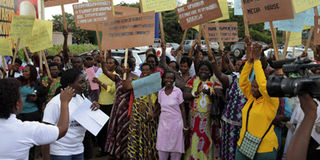Rwanda’s students in protest over BBC report

Women in Kigali protest against the BBC's controversial video documentary 'Rwanda's Untold Story' on October 24. The film has been widely condemned as propagating denial of the 1994 Genocide against the Tutsi. PHOTO | CYRIL NDEGEYA
What you need to know:
- The documentary, aired on BBC2 on October 1, suggests that many of the more than 800,000 Rwandans who died in the 1994 genocide may have been ethnic Hutus, and puts the number of Tutsi victims at 200,000 only, much lower than the official account of the one million being killed.
- The demonstration, the third of its kind in Kigali, the national capital of Rwanda, targeted an hour-long BBC documentary, entitled “This World: Rwanda’s Untold Story,” which genocide survivors and activists said trivialises the genocide against the Tutsi in Rwanda.
KIGALI
Thousands of students in Rwanda took to the streets at the weekend to protest against BBC’s documentary about the 1994 genocide in the country, demanding tougher action against the British broadcaster.
The demonstration, the third of its kind in Kigali, the national capital of Rwanda, targeted an hour-long BBC documentary, entitled “This World: Rwanda’s Untold Story,” which genocide survivors and activists said trivialises the genocide against the Tutsi in Rwanda.
The documentary, aired on BBC2 on October 1, suggests that many of the more than 800,000 Rwandans who died in the 1994 genocide may have been ethnic Hutus, and puts the number of Tutsi victims at 200,000 only, much lower than the official account of the one million being killed.
The film sparked nationwide anger among government officials, scholars as well as students.
The Rwandan parliament last month adopted a resolution banning BBC broadcasts in Kinyarwanda, the official language of Rwanda.
Singing patriotic songs and carrying placards denouncing the BBC, some 4,000 students from various universities in the country marched from Integrated Polytechnic Regional Center in Kigali to Nyanza Genocide Memorial Centre.
Isaac Kimenyi, an economics and management freshman, said he would not rest if the BBC “continues with genocide denial,” which is a crime in the country.





